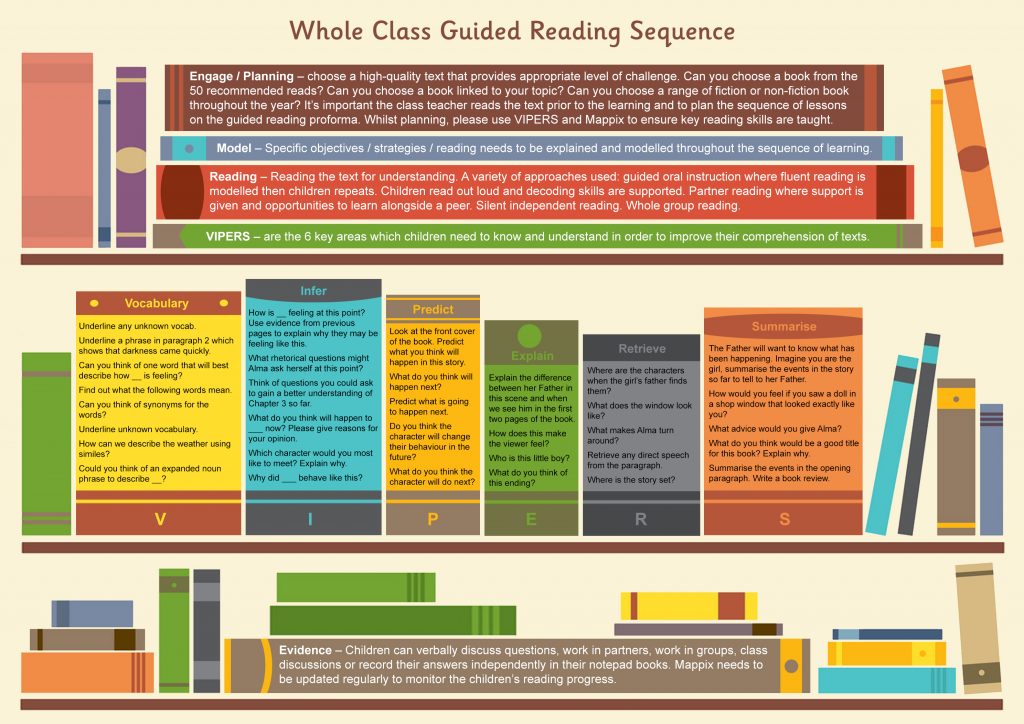
Reading and Phonics
Our Reading Intent
At Penpol School, we recognise that reading is a vital life skill and one which makes the world an altogether more remarkable place. We are absolutely committed to supporting each and every one of our pupils to learn to read, to love to read from a young age and to become independent life-long learners. Reading is prioritised in our timetable and in our resourcing, ensuring that no child is left behind.
Read, Write, Inc. Phonics and Reading
Throughout EYFS and KS1 we follow the Read, Write, Inc. programme where the children have daily, high energy, face-paced sessions providing an engaging and rigorous, systematic approach to the teaching of phonics and reading. Simple mnemonics help children to grasp the sounds quickly and sounds are taught at a pace of one a day, with sufficient time to practise, consolidate and apply.
Regular assessments enable leaders to closely monitor phonics progress and group children homogeneously. This fluid approach to assessment and grouping ensures that lessons are closely matched to ability, so pupils will always be challenged appropriately.
Read, Write, Inc. teaches children to:
- Decode letter-sound correspondences quickly and effortlessly, using their phonic knowledge and skills
- Read common exception words on sight
- Understand what they read
- Read aloud with fluency and expression
- Spell quickly and easily by segmenting the sounds in words
- Acquire good handwriting.
- To work effectively with a partner to explain and consolidate what they are learning.
This partner talk provides the teacher with opportunities to assess learning and to pick up on difficulties, such as pupils’ poor articulation, or problems with blending or alphabetic code knowledge.
RWI employs a ‘no hands up’ approach enabling more opportunities for learning and talk. Children at Penpol are secure with silent signals, team stop, MTYT (My Turn, Your Turn), partner talk and word waves.
The clarity of the scheme allows teachers and support staff to deliver consistently strong phonics and reading teaching, ensuring that children experience success from the very beginning, with Reception following the ‘Route Through Reception’ from Day one.
Lively books are closely matched to their increasing knowledge of phonics and common exception words so that, early on, they experience success and gain confidence that they are readers. Re-reading and discussing these books with the teacher, supports their increasingly fluent decoding.
Additional RWI sessions:
Fred Talk
Children in EYFS and any children not yet blending engage in daily Fred Talk games, where the adult orally segments words for the child to orally blend. These words are chosen according to their ability and are used to link to day-to-day tasks. E.g. s-i-t down please / put on your c-oa-t etc.
Afternoon Speed Sound Lessons
All children in EYFS and Year 1 have daily, whole class afternoon speed sounds lessons to support rapid progress, as well as the lowest 20% children in Year 2.
Pinny-time
Pinny time helps all children practise reading sounds taught so far speedily. This happens in EYFS and KS1, after the afternoon register for 5 minutes per class every day:
Catch-up Tutoring
Our least confident readers, throughout the school, each have an individual progress record and receive regular additional 1:1 tutoring support. Read, Write, Inc. trained support staff are deployed in Year 2 and Key Stage 2 to ensure that the right support is available to all.
RWI Virtual Classroom
Parents have access to the online Ruth Miskin Portal, where supporting RWI videos are uploaded weekly by teachers onto Tapestry / Showbie. These videos are either selected to support the afternoon speed sound learning in class or to address specific sound gaps for individual children.
Talk Through Stories Reading and Oracy Sessions
Teachers in EYFS and KS1 deliver regular ‘Talk Through Stories’ sessions books selected from the year groups reading spine. Using high-quality texts, children are supported in their oracy to learn new and exciting vocabulary and to develop their understanding of more complex themes not yet accessible when decoding themselves. The children engage in a range of activities:
- ‘Favourite phrases’ – practise favourite phrases using the MTYT approach where the teacher models expression.
- ‘Freeze-frame’ – role-play characters expression/emotions and exploring synonyms for these emotions.
- ‘Which sentence is right?’ – select from the options and justify their choices with evidence from the text.
- ‘Nice or Nasty?’ – children justify the personality of a chosen character, with supporting evidence from the text.
- ‘Quiz the Character’ – acting and answering questions in the role of a specific character.
Talk Through Stories Vocabulary Sessions
Applying the learnt vocabulary through a range of activities –
- Review the meaning
- When might you? – Helps children understand the Tier 2 words in context.
- Agree or not? – Decipher whether the word makes sense and is used in the correct context.
- What would make someone say? – Applying the word to everyday scenarios.
- What would you do if? – Deciphering the child’s true understanding of the word.
Classroom reading areas
Whilst at Penpol we design our reading corners to be inviting and engaging, we place the most important on the quality of the texts and their ability to attract the children’s attention. As a result, we have adopted a ‘less is more’ approach so as not to overwhelm children’s choices. We regularly update our selection of books to ensure that all books are engaging, relevant and challenging for all. We ensure that each classroom’s reading area has culturally and gender diverse, high-quality, vocabulary challenging texts as well as class favourites to enjoy and re-read, developing the children’s fluency.
Time is dedicated to discussing and selecting ‘books of choice’ to enjoy at home.
The RWI decodable books are stored in a central area in the infant library and selected by the reading adults for each child according to their ability.
Penpol Library
Each class has regular access to the infant/junior library. During these times pupil conferencing happens, where teachers discuss children’s book choices, discuss AR quiz results and support AR quizzing if needed. TA’s listen to readers who are not reading regularly at home.
Money has recently been spent ensuring that we have a range of high-quality, diverse and challenging texts that have been AR banded, allowing children to take them home and enjoy.
Reading Buddies
Each class in KS1 and KS2 has a reading buddy class from a different key stage that they visit once a week to share reading. The KS2 children have either learnt phonics themselves through the RWI programme or have had training on this, enabling them to support decoding adequately.
The children love this experience and are able to learn from their peers. The older children are brilliant at modelling expression, intonation and discussing the text with the younger children, through the use of VIPERS style questions.
Guided Reading
Once children have completed the Read, Write, Inc. programme, guided reading takes place daily. At Penpol, we use a ‘whole-class’ approach for guided reading.
Teachers use engaging texts to inspire and motivate pupils, using the VIPERS system (Vocabulary, Inference, Prediction, Explanation, Retrieval and Sequence – KS1 / Summarise – KS2) to develop broad and confident comprehension skills for all.
The ‘PEE’ approach is used for the Explanation section – Point, Evidence, Explain.
Following our agreed Whole Class Guided Reading lesson structure, teachers model a passion for reading, provide appropriate challenge for all and particular support where it is needed.
Access to and engagement with the text, for all, is ensured by a range of reading strategies including:
- Repetition – MTYT (My Turn, Your Turn)
- Choral reading
- Partner reading (tracking the words for your partner whilst they read)
- Paired reading (with an adult until confident)
- Whisper partner reading (one child reads out loud whilst the partner whispers along)
- Independent reading (out loud)
- Independent reading (in your head)
- Volunteer independent reading to the class
Accelerated Reader
To support the individual reading journey of pupils who have progressed through and completed the RWI reading programme, from Years 2 – 6, we use the Accelerated Reader programme.
Accelerated Reader makes use of regular iPad quizzes assessing children’s reading fluency and comprehension understanding, which enables staff to motivate, monitor and manage children’s book choices. This generated reading range ensures that each child has access to challenging yet accessible texts which interest them.
The Accelerated Reader system incorporates a huge range of fantastic titles from many different publishers. This allows us to stock our school library with high-quality texts, organised by level of challenge.
Reading Assessment
Children on the RWI programme are assessed a minimum of half termly using the RWI assessments.
Children on Accelerated reader are assessed half termly using the Star Reader assessment – to generate a reading range for their home reading books.
In order to prepare for the experience of sitting a statutory assessment, children in Year 2 and 6 are assess their confidence using past SATS papers.
All children in Key Stage 2 practise applying their skills using Testbase assessment resources.
Teachers also assess using their teacher judgement of the year group objectives on Tapestry (EYFS) and Mappix (Sonar from September 2022).
Reading at Home
The most powerful way that you can support your child’s learning at home is by reading fantastic texts with them as often as you can and by supporting them to read daily, wherever possible. For early readers, this may well involve listening to them read out loud. When they are more confident, children may choose to read in their heads which should not be discouraged. However they read, your questioning and discussion around the text supports development of deeper comprehension skills.
The children who are on the RWI programme take their class RWI book, a corresponding RWI ‘Book Bag Book’ and two ‘books of choice’ from the class reading area.
Children on the Accelerated Reader programme take a book from within their reading range, which they then quiz on before swapping it for their next book.
Teachers regularly communicate with parents and guardians using our Tapestry and Showbie programmes. Here teachers may recommend resources and videos to access at home to support reading development, such as the RWI virtual classroom. Parents all have access via Showbie, to example VIPERS questions to support this book discussion at home. Children’s reading journals are used by teachers to keep track of their home-reading journey. Any children who are not reading regularly at home are then supported by the Reading Army and TA’s.
Book Boxes
To support the passion for reading, each class has a book box that is sent home with a different child each week. Inside the boxes are a range of texts alongside a variety of items to use with an adult to enhance the reading experience. E.g. hot chocolate sachets, create your own bookmarks, teddies etc.
Reading Army
We regularly invite parents and guardians to join our ‘reading army’ at Penpol. Receiving training and support, these volunteers provide additional support to less confident readers and to those less able to access stories at home. All Reading Army volunteers have access to the online RWI training.
Class Stories and Reading Spines
Daily story-times are timetabled into the school day and are a much-loved experience by all.
Each year group has a carefully selected reading spine with books from a range of genres, books that celebrate diversity, class/teacher favourites and books from the Top 50 recommended reads for each year group. These high-quality texts, with a focus on rich language and challenging contexts are used for learning across the curriculum, guided reading and class ‘readers’. These books are celebrated on each classroom’s door, raising the profile of the experience for all.
Poetry and Singing
We understand the power of poetry and singing, particularly for younger pupils as they build their vocabulary and early reading skills. Therefore, poetry and singing time is timetabled across the Early Years Foundation Stage and Key Stage 1.
Tutoring Catch-up for the least confident readers
For those on the Read Write Inc. Phonics programme, we record their starting date and entry point on the tracker to monitor the rate at which they are making progress using the half termly assessments. We identify those children who are at risk of falling behind their peers immediately – whatever their age. Highly trained staff tutor the least confident 20% of readers for 10 minutes regularly, using the Read Write Inc. One-to-one tutoring programme.
IDL
We use a programme called IDL (International Dyslexia Learning) across the school on iPads and laptops. The IDL Literacy Intervention is a speaking-computer based multi-sensory system which supports learners with dyslexia and other learning difficulties to increase their reading and spelling ages. The programme was specifically designed for those with dyslexia and is used as an intervention but is also be used effectively as a school wide literacy solution and will enable all children to make progress.
The Literacy software incorporates all aspects of a balanced literacy programme and is structured, yet flexible enough to cater for individual differences. In addition to covering the reading process from phonological awareness to fluency, the software includes components that improve spelling, handwriting, vocabulary and comprehension skills.
Neli
The Nuffield Early Language Intervention (NELI) is a programme for children in Reception (4-5 years) which has been found to improve children’s language and early literacy skills. The programme involves a trained teaching assistant providing short small-group and individual teaching sessions to around 3-6 pupils for 20-weeks. Robust evaluations found NELI children made on average 3 months of additional progress in language.
Annual Reading Events
- World Book Day
- Reading and Writing is Magic Festival
- National Poetry Day
- Roald Dahl Day
- PRIDE – Free to be Me

Useful Links
This page was last updated:
10th June 2022





